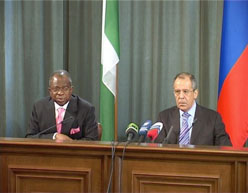Russia and Nigeria pledge to further boost cooperation across all sectors of bilateral diplomacy

MOSCOW, Russia – The Russian and Nigerian governments plan to boost the current volume and spectrum of their bilateral economic ties, making them more reflective of the friendly and robustly growing diplomatic relationships between the two countries.
Indeed, the need for the activation of the search for realistic ways of deepening the current scope of the existing cooperation between the two countries – both on bilateral issues relating to just Moscow and Abuja alone, and also on multilateral subjects within the UN structures and other international agencies, especially those promoting efforts aimed at solving the problems on the African continent – was one of the several key issues on the agenda that Ojo Maduekwe, the visiting Nigerian foreign affairs minister, discussed with his Russian counterpart, Sergei Lavrov, who was also upbeat about the prospects of boosting Moscow's robust bilateral ties with one of Africa’s largest economies.
Searching for ways to boosting bilateral cooperation
The fact that Moscow and Abuja had reached agreements and/or found common grounds on the all issues on the agenda was evident from the friendly rapport between the two countries’ top diplomats at the joint press conference held at the end of the talks between the two parties on the Smolensky Square, the home of the Russian foreign affairs ministry in central Moscow, earlier this month. “We have held substantive and productive talks, as we thoroughly reviewed the state of and prospects for our bilateral relations. Nigeria today holds the second place in trade among Russia’s sub-Saharan partners,” Lavrov said.
Lavrov also noted that Moscow hopes that the Intergovernmental Commission on Economic and Scientific-Technical Cooperation (ICESTC) will arrive at agreements that will enable more active use of the very rich potential that both Russia and Nigeria possess in the trade and economic fields, in the execution of large investment projects. “These include projects related to the development of Nigeria’s infrastructures, the ferrous and nonferrous metals industry, electric power generation, including nuclear energy, and the extraction of hydrocarbon and other raw mineral,” he added. “We agreed to speed up work on modernizing the juridical base of our relations. A whole array of important draft documents is in the stage of elaboration and detailization, including the Agreement on the Encouragement and Protection of Investments.”
From his side, Maduekwe noted Nigeria hopes to sign new agreements in the sphere of economic cooperation. “We want to use the invitation to visit Moscow within the ICESTC frameworks to sign new accords in such areas as electricity, light industry, and in fact, across all spectra of bilateral economic cooperation,” he added. The new agreements will complement other previous high-profile bilateral accords signed just months ago, when the Nigerian top diplomat visited Moscow. Two of those agreements — one regulating the peaceful use of nuclear energy and the other penned with Gazprom, which envisages the participation of the Russia-based, world’s largest energy corporation in the exploration and development of oil wells and gas reserves in Nigeria — helped underscore the growing affinity between the political leaderships of two nations and the strategic nature of their bilateral cooperation, despite the growing negative impacts of the global economic crisis. “We are confident that all the agreements with Russia will be fully honored,” Maduekwe added.
Advocating a joint front on global issues
Apart from bilateral issues, the two top diplomats also discussed several topics on regional and international importance, and again, they seemed to have found a common wavelength in their negotiations. “Our countries’ approaches to pressing international and regional problems are close, and in most cases coincide,” the high-ranking diplomats said. “Both Russia and Nigeria are advocating for strict and universal observance of the norms and principles of international law and for a stronger central role for the United Nations, particularly, the effective reformation of the UN with regard for the interests of developing nations, including African countries,” Lavrov noted.
Commenting on the general situations in Africa, Lavrov noted that Russia is sincerely interested in supporting the efforts of African countries to settling the various conflicts on the continent. “And, particularly, we appreciate and support Nigeria’s active leading role in a number of conflict situations on the continent, and we plan to make extra efforts to render due assistance to the work of our Nigerian friends,” he said.
On a more strategic note, both diplomats agreed that there are very good prospects for the development of more fruitful bilateral ties between the countries. “By and large, we are convinced that the Russian-Nigerian relations have very good future prospects,” Lavrov noted. “I am certain that the visit of Maduekwe will contribute to maximally effective realization of these possibilities.”












 Web design,
Web design,